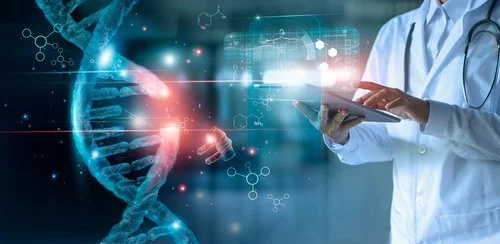How Precision Medicine Uses Data Science For Individual Treatment
Digital health companies are on the rise, with $3.5 billion invested in 188 companies in half of one year and 1.2 billion “clinical documents” composed each year, of which doctors and researchers must look for correlations to analyze. Read on to find out how “precision medicine” is revolutionizing the health care industry.
Image courtesy of University of San Diego
What is medical data science?
Medical data science “has the strongest potential to revolutionize healthcare,” from preventative care to diagnostic accuracy to personalized care.
One such algorithm analyzes individual patients’ lifestyles and behavior, and uses that information to create customized programs for the patients, giving doctors and healthcare workers a more accurate and detailed story and therefore allowing them to make more informed decisions about the patient’s treatment plans.
A SHORT HISTORY OF HEALTHCARE
Healthcare originally focused on the individual, taking into account specific symptoms, lifestyle, living conditions, pre-existing conditions, etc. Eventually, this process of individualism became universalism, which focused on the disease and the treatment of the disease instead of treating each case as distinct.
While universalism is arguably more efficient (and used today), there are still many benefits of aspects of individualist approaches. For example, once a patient has been diagnosed with a disease, they can be monitored more closely and accurately through technology for the exhibition of symptoms and the progress of the disease.
Using this data, individual health care plans and personalized treatment is much more easily created, which in turn benefits the patient to a greater extent and can even reduce that disease’s overall death count. This could also be incredibly beneficial in end-of-life care, for terminal diseases, as the most important part becomes symptom treatment/lessening, which varies from person to person and can often vastly improve the patient’s quality of life, as well as the lives of their loved ones and caretakers.
ELECTRONIC HEALTH RECORDS & GENOME SEQUENCING
Electronic Health Record adoption and genome sequencing also pose similar benefits: genome sequencing specifically creates accurate base genome maps. This allows doctors to base data and specific patients off of those standard sequences, and identify changes/alterations more accurately and efficiently. Specifically, they can “identify consistent patterns in symptoms and create accurate patient profiles.”
What is precision medicine?
This is called precision medicine.
“The core premise of precision medicine is that the integration of genetic information, EMR (electronic medical records) data, and rich dynamic phenotypic information will enable sophisticated patient segmentation, revealing biologically distinct subgroups and pointing the way to precisely targeted treatments.”
Data science is incredibly important when compiling information from cases of diseases that are widespread and lethal: for example, cancer. Individual cases can be analyzed in order to determine specific genes and cells that are often mutated, what processes can help the best, etc. As well, such programs are much more efficient, and can analyze millions of individuals' data in a matter of hours or days instead of months or years. The faster we can fight new (and old) diseases, the fewer people have to die.
The future of healthcare
While universal approaches have been the norm, more personalized care has been made possible through medical data science. This intersection between programming and medicine has the potential to improve the quality of life of terminally ill patients, map the human genome in order to develop precisely targeted treatments, and so much more.
The applications of data science in precision medicine are endless and rapidly becoming more widespread and comprehensive, resulting in dynamic and meaningful discoveries.

